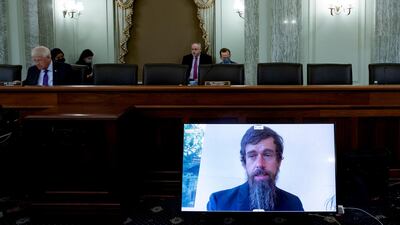Three of the most prominent technology chief executives appeared before the US Senate on Wednesday to defend content moderation policies during the election period.
Members of the Senate committee on commerce, science and transport grilled the chiefs of Twitter, Facebook and Google.
Exchanges became increasingly heated as senators accused the tech giants of censorship.
The issue at the heart of the hearing was Section 230 of the Communications Decency Act, which distances companies from content posted on their platforms and gives them immunity from liability for anything posted by users.
But some senators said this hands-off approach shielded the large technology companies from accountability over their influence on how information, authentic and fake, reached users.
The platforms have played an important role during the presidential campaigns, with their influence strengthened by the coronavirus pandemic that has forced candidates to rely more heavily on digital events.
“I don’t like the idea of unelected elites in San Francisco or Silicon Valley deciding whether my speech is permissible on their platform,” Senator Cory Gardner said.
“But I like even less the idea of unelected Washington, DC, bureaucrats trying to enforce some kind of politically neutral content moderation.”
Mr Gardner criticised Twitter chief executive Jack Dorsey for not applying the same restrictions Mr Trump faces to other world leaders, such as Iran’s Ayatollah Ali Khamenei.
He insisted Twitter should take action against the Ayatollah's holocaust denials.
Shortly after the exchange, Mr Khamenei tweeted: “Why is it a crime to raise doubts about the Holocaust?
"Why should anyone who writes about such doubts be imprisoned while insulting the Prophet is allowed?”
Twitter has previously taken action against Mr Khamenei’s account, removing a tweet about Salman Rushdie for the "threat of violence or physical harm".
The account was locked until the Iranian supreme leader agreed to delete the tweet.
Republicans had their sights on Mr Dorsey throughout the hearing.
Senator Roger Wicker asked why undemocratic governments were allowed to share propaganda without consequence but Mr Trump’s tweets were subject to labels and warnings.
Part of the reason for this may come America and Europe more often threatening regulation against the tech giants.
The social media platforms that were largely hands-off in 2016 when it came to misinformation have taken a harsher stance for this election.
Coming under increasing public scrutiny, Facebook has deleted posts from Mr Trump and removed his campaign advertisements for promoting falsehoods.
In recent months, the president’s ever-active Twitter account has had tweets hidden for “glorifying violence” and “making misleading health claims”.
Democratic senators urged tech platforms to take even stronger action against misinformation, election interference and extremism.
Mr Trump has already questioned whether the results of the election will be recognised because of mail-in voting, despite experts agreeing that the long-used method is safe and secure.
All three executives said they had plans in place to respond to any potential attempts to delegitimise the election results.
Democratic senators including Amy Klobuchar questioned the timing of the hearing and accused Republicans of using it as a campaign push for Mr Trump.
Senator Ted Cruz had promoted the Senate hearing by sharing an image on Twitter titled "Free Speech Showdown, Cruz v Dorsey".


